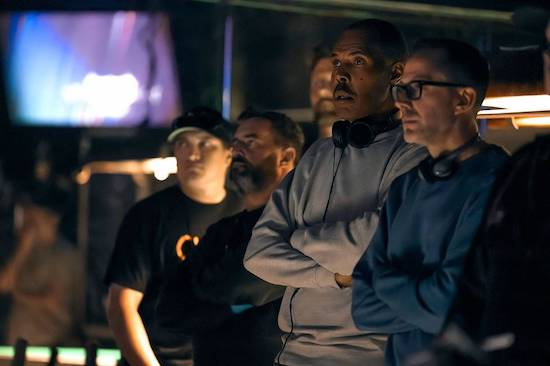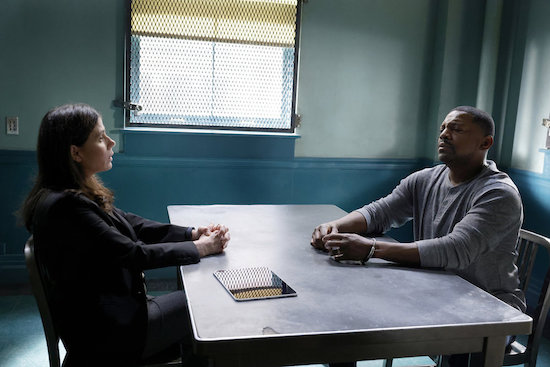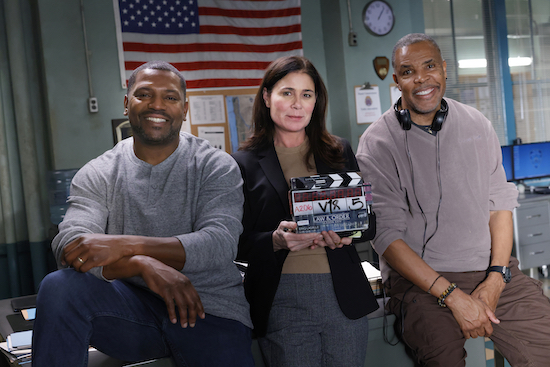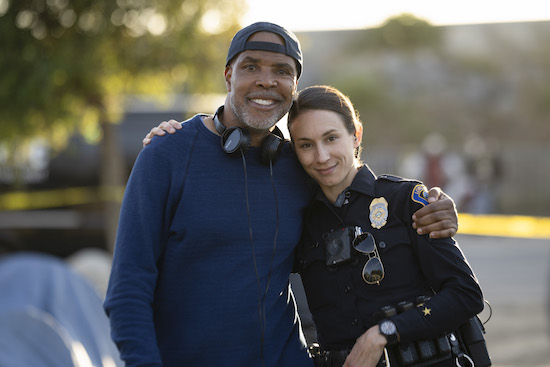Eriq La Salle on LAW & ORDER’s ER Reunion, Shaping ON CALL’s Look, and His Directing Legacy
January 22, 2025 by Marisa Roffman

Eriq La Salle and Tim Walsh “On Call” BTS | Photo Credit: Elizabeth ‘Liz’ Morris
After more than 30 appearances behind the camera for Wolf Entertainment shows, Eriq La Salle’s directorial turn on Thursday, January 23 episode of LAW & ORDER has an extra special nod to fans familiar with his acting work: “Greater Good” serves as a mini ER reunion.
According to the official logline for the hour, “When a music mogul is found dead, Shaw and Riley clash with an undercover officer unwilling to cooperate. Price and Baxter disagree on how the victim’s reputation could sway the jury’s verdict in the case.” Mekhi Phifer guest stars as Lyman Ross opposite Maura Tierney’s Lieutenant Jessica Brady. (The duo appeared together on ER as Pratt and Abby, respectively.) Also appearing in the hour is Michael Beach, who returns as Attorney Harris and recurred on ER as Al.
La Salle, of course, was part of the original cast of ER, playing Peter Benton for eight seasons. (And returning for a couple of episodes in the final season.) He’s also been one of the key directors in the Wolf Entertainment world for nearly a decade, helming recent episodes of LAW & ORDER, FBI, and LAW & ORDER: ORGANIZED CRIME, as well as serving as the directing producer on the recent Prime Video series ON CALL. (La Salle, who primarily has worked as a director in recent years, also co-starred in ON CALL.)
Here, the actor-director speaks with Give Me My Remote about bringing together the ER reunion on LAW & ORDER, establishing the look for ON CALL, working with Wolf Entertainment, mentoring other aspiring directors, and more.
The first episode of television you directed for a Wolf Entertainment show was a 2007 episode of LAW & ORDER: SPECIAL VICTIMS UNIT, “Burned.” How did the professional relationship with you and the company start?
The first few directing jobs that I did, one was for HBO, a film called REBOUND, and then I followed that up with a pilot for Showtime called SOUL FOOD. And then when it was suggested that I started looking into getting into episodic [television], which was going to be definitely more steady work. I had a relationship with Dick Wolf because I did [THE HUMAN FACTOR] with him, a medical show before ER. And so it just made sense and I just kind of landed there. The episode that I did was a very popular one, so they asked me to come back and do another one. [2008’s “PTSD.”] And then things were pretty much built from there.
View this post on Instagram
From the outside, it feels like you really became integral to the Wolf Entertainment world when you joined CHICAGO P.D. as their producing director; much of your directing work from 2016-2021 was also in the ONE CHICAGO world. Now, when you direct an episode—like your recent installments of FBI and LAW & ORDER—how do they approach you?
Well, this is family. Things are very informal. It’s like, “Hey, can you come do this show? And can you come to this episode?” [Laughs.] And a lot of times it’s, “This is a special episode.” Rick Eid, who ran CHICAGO P.D., he and I went in [to that show] together. He was the showrunner and he then took over FBI [before departing last season] and he does LAW & ORDER [now]; he was doing both shows simultaneously. He could just call and say, “Hey, do you want to come and do an episode of LAW & ORDER?” So it’s very informal because it’s a lot of trust and history in the camp. And so it’s just really just a matter of if I feel like being in New York at a certain time. But normally it’s usually, these are some really interesting stories, and I think I can do something interesting.
In the case with Rick, he’ll give me a synopsis [and] say this is what I’m thinking about writing. And I’m like, “Wow, that’s a cool thing. I’m in.”
FBI was a show that they had been wanting me to do, and I had never done one. I met the [FBI] producers at a wedding in the summer, and they were great people. And I was like, “I’ll come play with you guys.” So each show is pretty much that. But the general thing is very informal, family, and you just reach out and say, “Hey, come on and play.”
View this post on Instagram
The Thursday, January 23 episode of LAW & ORDER is a special one because it’s a little ER reunion. Maura mentioned you were actually the one to reach out and get Mekhi into this episode. What made the timing right for this?
I like to operate very much with that same mentality of the family approach. And if I’ve worked with people, I like just reaching out to them personally. In the case of Mekhi, he had done a really wonderful episode of CHICAGO P.D. [2018’s “Captive.”] Well, first of all, he and I have known each other for 20-plus years or so. But he did a special episode for us on CHICAGO P.D., back in the day. It was a really badass character, very tough and angry. And so I just called him up and said, “This character is just the opposite of what you did on CHICAGO P.D. This guy is very gentle. He’s a good guy, and does something bad.” And he was just like, “Look, I love working with you. Of course.” So, we had one phone call and he was in.
I love keeping things informal. And I think when you respect people, and when people respect you, it makes it a lot easier.

LAW & ORDER — “Greater Good” Episode 24011 — Pictured: (l-r) Maura Tierney as Lieutenant Jessica Brady, Mekhi Phifer as Lyman Ross — (Photo by: Will Hart/NBC)
Are there any kind of homages to ER beyond the obvious reunion that you put into your directing of “Greater Good”?
No, I’m always just trying to tell the best story. And I’m always trying to complicate the characters and the story as much as possible to entertain the audience, but to entertain them in a very intelligent way and not talk down to them. So I come in and do that.
It was very interesting because [with] Maura, I directed the episode [where] her character was introduced [in] the season premiere. And then when I went back, [it was] Mekhi Phifer and Michael Beach, who also was on ER, so it was a mini ER reunion. It felt great, but we all like each other, and had a lot of fun. That’s very important to me.
View this post on Instagram
When we spoke last month, you mentioned that Michael Beach is one of your best friends. He’s been on LAW & ORDER before, but were you the one who suggested he appear in this episode, too, or was that a pleasant surprise when you got the script?
With this episode, I requested him. They basically have a group of defense attorneys that they go to, and so I said, “I think Mike would be good for this.” And Rick trusts me and respects me. And Rick is also a big fan of Michael Beach’s, so he thought it was a great idea. I’ve worked with Michael, I don’t know, 15 times or something like that? [Laughs.] When[ever] I can because he’s hard-working, he elevates, and we happen to be best friends. But in this case, he had already been cast as a defense attorney on the show…he’s appeared in two of my episodes of LAW & ORDER as the same character.

LAW & ORDER — “Greater Good” Episode 24011 — Pictured: (l-r) Mekhi Phifer, Maura Tierney, Eriq LaSalle — (Photo by: Will Hart/NBC)
LAW & ORDER is a bit more rigid in its format with the first half being devoted to the investigation and the second half focusing on the law/trial. For you as a director, what are the fun and challenges of working with those constraints compared to a show where you don’t know what you’ll get when you pick up a script?
The advantage is basically you’re telling two stories within one: The perspective of the cops chasing and capturing, and then the law side of it, of the prosecuting. So each has different energies and different tones. And so it’s kind of cool…it’s almost two shows in one. You go from the grind of the cops to the courtroom drama.
Every show has its own DNA. Every show has its own blueprint, and it’s your job as a director to go in and find what that is and to make it the best that it can be, and to elevate it as much as possible.
And, look, some things are the same across the board: Strong characterization, inner obstacles, outer obstacles—that just makes for great storytelling. So there are just certain tenants and certain basic things that just make for great storytelling, no matter what type of character you’re playing, no matter what story you’re playing. But then certain stories break down more specifically. Obviously, the pace of how I direct a courtroom scene is going to be different from cops chasing someone down an alley. But there are certain similarities at times. So you just really respect the material and the style of the show.
View this post on Instagram
On the flip side, with something like ON CALL, you were there from the ground floor and got to establish the look and shape of the show. What was that experience like?
Over the years of directing, I’ve been known as a fixer; coming in and sometimes helping shows that maybe have not found their rhythm or their groove or what the heart of the show is. Coming in and elevating performances and tightening stories. A lot of times the producers are like, “This is what the show is. Thank you for helping us to find it.”
We were fortunate enough to come in and revamp CHICAGO P.D. and take it in a different direction. And so I think that created even more trust of, “Why don’t we start this from the beginning?” Directing a pilot is a great honor because you’re laying down the rules, the tone, the casting.
And so this was just something that felt right. They like how I work and what I do, and they thought that this required my skill set. They knew they had a really interesting concept, but it was going to require a lot of finessing and we couldn’t lose sight of the characters. We didn’t want this show to feel in any way gimmicky, and so we knew we wanted to shoot it a different way. But it has to be grounded in character, and character is what I specialize in. Coming from being an actor, I pay a lot of [attention]l to performance, so no matter what you’re dealing with at the end of the day, you have these amazing characters to hold on to. They bring you through this world, and they bring you through the different ways that it’s shot. They bring you through this voyeuristic thing, this much more immersive point of view. But at the end of the day, you’re holding on to character.
So it felt, from their point of view, like a good fit to come in and put my stamp on it. For several years, I’ve been doing some solid work that they have been very proud of and that I’ve been proud of. So [it was], “Okay, this is the one that you’ve been wanting. So go have fun with it.”
And it was Dick Wolf’s foray into streaming. I think they wanted someone that knew the camp very well, told stories a certain way, pushed the boundaries—because this pushes boundaries. So it just lined up very much with my skill set and what I’ve been able to establish over the years, not just in this camp, but in the industry as a director. And so it was one of those perfect timing type situations.

Eriq La Salle and Troian Bellisario “On Call” BTS | Photo Credit: Elizabeth ‘Liz’ Morris
Wolf Entertainment really has a stable of actor-directors who helm their shows, and a number of them—including CHICAGO MED vet Brian Tee—have cited your leadership and mentorship when they were aspiring to direct. Given your experience as both an actor and a director, how much are you actively looking to take multi-hyphenate performers under your wing?
We were fortunate—even Monica Raymund, who is in the first scene [of ON CALL], she’s a working director. So to call her up and convince her to do it was great. And she’s off doing, I believe, DEXTER.
Obviously, it’s cool, because people understand it from a more intelligent point of view. When you’re working with someone who looks at things from a director’s point of view, they understand what you’re going for. And so it’s really cool [they] give you a little extra thing there.
I think also just working with intelligent actors [helps]—and I have very, very intelligent actors in [ON CALL’s] Troian [Bellisario] and Brandon [Larracuente]—Brandon is in the process now of his journey as a director, directing short films. During the strike, and during all this time in between, he’s been off doing his thing. So I know he has aspirations to direct. I’m not sure about Troian, but they [both] have an intelligence that lends to be much more in-depth and in sync with me as a director. But I think that that comes from being a smart actor.
I’m very, very passionate about being able to tell stories, and it’s what I love doing. Sometimes it’s very infectious. And I think that [Brian] Tee and people that I come into contact with, they see it, and we end up talking about it. And any way that I can help them, then I will. I’ll put them in a position and prepare them so that when they get that opportunity, they’re ready.
And then that starts speaking to, I think, legacy. And when I say legacy, I just mean I think there are a lot of mediocre directors in our industry. And I think that there’s a lot of really talented directors in our industry! I guess that’s true of any profession, but it just really demands, I think, a great understanding of craft. Because I think that’s what will ultimately save our industry, and that’s what will always give our industry longevity, is if we’re turning out people that have a really strong understanding of craft. And so I promote craft. Whether I’m talking to you as a director, when I’m talking to you as a crew member, I really, really push you to deepen your understanding and expression of your craft.
And I stand by that’s how I live, that’s how I move, that’s how I work. And so I promote that. So it’s always great when people pick up on that. And whatever they’re positioned as: As an actor, as a crew member, it’s just great. And that’s why I think part of the reason [for] the success of ON CALL is that people really showed up knowing their craft and learning their craft and being committed to their craft and elevating their craft. And that’s all you want. With that, you’re going to get amazing turnout. And I think we see the results of that in how ON CALL turned out.
This interview has been condensed and edited for clarity.
LAW & ORDER, Thursdays, 8/7c, NBC
ON CALL, Now Streaming
RELATED:
- ON CALL Post-Mortem: Elliot Wolf and Tim Walsh React to Monica Raymund’s Cameo
- LAW & ORDER: Mekhi Phifer to Guest Star
- ON CALL: Elliot Wolf and Tim Walsh Preview the Unconventional New Cop Drama
- Eriq La Salle and Lori Loughlin Discuss Joining Prime Video’s ON CALL
- ON CALL’s Troian Bellisario and Brandon Larracuente Preview Their On-Screen Partnership: ‘It’s Going to Change a Million Different Ways’
Follow @GiveMeMyRemote and @marisaroffman on Twitter for the latest TV news. Connect with other TV fans on GIVE ME MY REMOTE’s official Facebook page or our Instagram.
And be the first to see our exclusive videos by subscribing to our YouTube channel.
As an Amazon Associate we earn from qualifying purchases made through links/ads placed on the site.
Related Posts
Filed under Law & Order, On Call
Comments Off on Eriq La Salle on LAW & ORDER’s ER Reunion, Shaping ON CALL’s Look, and His Directing Legacy



Comments